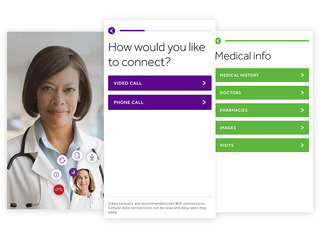Digital health funding declines for the third year in a row
AI-enabled digital health startups raised $3.7B, 37% of total funding for the sector
Read more...
In 1980, 108 million people around the world had diabetes; as of 2021, that had risen to 537 million people worldwide, or over 6% of the global population, a number that is expected to increase to 643 million by 2030 and 783 million by 2045. Yet, poor medication adherence is common in people with type 2 diabetes (T2D), with some studies showing that less than 50% of patients achieve recommended glycemic goals. Other studies have found that 38% don't adhere to treatment in the first year of their diagnosis.
On Monday, the company released new data today from two studies, which it presented at the American Diabetes Association’s 84th Scientific Sessions, showing how its predictive modeling capabilities can help members with type 2 diabetes control their blood sugar through participation in its diabetes management program.
The first study examined the effectiveness of personalized health nudges for improvement in self-monitoring of type 2 diabetes, particularly for those individuals that were previously identified as being at-risk for uncontrolled outcomes in the future.
Conducted over a nine month period, the study showed a 3X increase in engagement, as well as an additional 0.4 reduction in A1c, with members going from 8.2% to 7.8%, for those targeted with personalized health nudges, meaning notifications that are sent to them via their mobile or cellular connected device, after being identified as at-risk for uncontrolled diabetes through AI.
Previous research had shown that Teladoc Health has the ability to proactively identify a person at-risk for uncontrolled outcomes more than a year in advance through the use of AI. This "is crucial for the early detection and management of diabetes," the company said, as it "allows for more timely, personalized interventions to avoid complications, improve outcomes, and better control costs for employers and health plans."
The second study revolved around evaluating how tailored email content can be used to increase 1:1 coaching in digital programs for type 2 diabetes. These newsletters used predictive models to suggest the next best action, such as coaching or digital activities, for managing their chronic condition based on that members' engagement with Teladoc Health’s services.
Members that received personalized next-best actions, powered by predictive modeling, in their enhanced weekly email were 50% more likely to engage in coaching services, compared to those who received the standard newsletter.
Teladoc's diabetes management program provides users with an advanced blood glucose meter, unlimited strips and lancets, 24/7 real-time support for out-of-range readings, as well as personalized tips, action plans and coaching. The meter automatically uploads their blood sugar readings to the user's account on the Teladoc Health app, providing real-time tips and insights after every check. If the reading is out of range, a Teladoc Health expert coach will reach out to the patient.
In 2020, the company completed its merger with Livongo, a personalized health program tha help people manage their diabetes, blood pressure, and weight.
“Teladoc Health has a long-standing history of successfully using data to improve health outcomes for our members, and new applications of AI are helping us accelerate our impact,” Sal Shafiq, chief data and analytics officer at Teladoc Health, said in a statement.
“Our ability to use data to empower members in the moment is crucial, but the true power lies in our ability to predict health risks and make prevention a reality.”
(Image source: teladochealth.com)
AI-enabled digital health startups raised $3.7B, 37% of total funding for the sector
Read more...OXcan combines proteomics and artificial intelligence for early detection
Read more...Nearly $265B in claims are denied every year because of the way they're coded
Read more...
